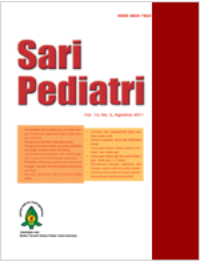Peran Bifidobacterium dalam Perkembangan Otak dan Tumbuh Kembang Anak
Sari
Kata Kunci
Teks Lengkap:
PDFReferensi
Cerdó T, RuÃz A, Suárez A, Campoy C. Probiotic, Prebiotic, and Brain Development. Nutrients 2017;9:1247.
Skonieczna-Zydecka K, Marlicz W, Misera A, Koulaouzidis A, Åoniewski I. Microbiome - The Missing Link in the Gut-Brain Axis: Focus on Its Role in Gastrointestinal and Mental Health. J Clin Med 2018; 7:521.
Onubi OJ, Poobalan AS, Dineen B, Marais D, McNeill G. Effects of probiotics on child growth: a systematic review. J Health Popul Nutr 2015;34:8.
Firmansyah A, Dwipoerwantoro PG, Kadim M, dkk. Improved growth of toddlers fed a milk containing synbiotics. Asia Pac J Clin Nutr 2011;20:69-76.
Chouraqui JP, Grathwohl D, Labaune JM, dkk. Assessment of the safety, tolerance, and protective effect against diarrhea of infant formulas containing mixtures of probiotics or probiotics and prebiotics in a randomized controlled trial. Am J Clin Nutr 2008;87:1365–73.
Puccio G, Cajozzo C, Meli F, dkk. Clinical evaluation of a new starter formula for infants containing live Bifidobacterium longum BL999 and prebiotics. Nutrition 2007;23:1–8.
Roze JC, Barbarot S, Butel MJ, dkk. An a-lactalbumin-enriched and symbiotic-supplemented v. a standard infant formula: a multicentre, double-blind, randomised trial. Br J Nutr 2012;107:1616–22.
Abrahamse-Berkeveld M, Alles M, Franke-Beckmann e, dkk. Infant formula containing galacto-and fructo-oligosaccharides and Bifidobacterium breve M-16V supports adequate growth and tolerance in healthy infants in a randomised, controlled, double-blind, prospective, multicentre study. J Nutr Sci 2016;5:e42.
Cerdó T, GarcÃa-Santos JA, Bermúdez MG, Campoy C. The role of probiotics and prebiotics in the prevention and treatment of obesity. Nutrients 2019;11:635.
Abenavoli L, Scarpellini E, Colica C, dkk, Gut microbiota and obesity: a role for probiotics. Nutrients 2019;11:2690.
Cerano C, Da Silva BS, Monteil MA, Davis EM. Overweight and obesity in children are associated with an abundance of firmicutes and reduction of bifidobacterium in their gastrointestinal microbiota. Child Obes 2020;16:204-210.
Ristori MV, Quagliariello A, Reddel S, dkk. Autism, gastrointestinal symptoms and modulation of gut microbiota by nutritional interventions. Nutrients 2019;11:2812.
Luk B, Veeraragavan S, Engevik M, dkk. Postnatal colonization with human “infant-type†Bifidobacterium species alters behavior of adult gnotobiotic mice. PLoS One 2018;13: e0196510.
Pärtty A, Kalliomäki M, Wacklin P, Salminen S, Isolauri E. A possible link between early probiotic intervention and the risk of neuropsychiatric disorders later in childhood: a randomized trial. Pediatr Res 2015;77:823-828.
Partty A, Kalliomaki M, Endo A, Salminen S, Isolauri E. Compositional development of bifidobacterium and lactobacillus microbiota is linked with crying and fussing in early infancy. PLoS One 2012;7:e32495.
Lacorte E, Gervasi G, Bacigalupo I, dkk. A systematic review of the microbiome in children with neurodevelopmental disorders. Front Neurol 2019;10:727.
Berding K, Donovan SM. Diet can impact microbiota composition in children with autism spectrum disorder. Front Neurosci 2018;12:515.
Razafindralambo A, Razafindralambo H. Gut microbiota profile autism spectrum disorder relationship: diversity and imbalance in probiotics. J Prob Health 2019;7:209.
Xu M, Xu X, Li J, Li F. Association between gut microbiota and autism spectrum disorder: a systematic review and meta-analysis. Front Psychiatry 2019;10:473.
Ho LKH, Tong VJW, Syn N, dkk. Gut microbiota changes in children with autism spectrum disorder: a systematic review. Gut Pathog 2020;12:6.
Ng QX, Loke W, Venkatanarayanan N, Lim DY, Soh AYS, Yeo WS. A systematic review of the role of prebiotics and probiotics in autism spectrum disorders. Medicina 2019;55:129.
Bull-Larsen S, Mohajeri MH. The potential influence of the bacterial microbiome on the development and progression of ADHD. Nutrients 2019;11:2805.
Sordillo JE, Korrick S, Laranjo N, dkk. Association of the infant gut microbiome with early childhood neurodevelopmental outcomes. An ancillary study to the VDAART randomized clinical trial. JAMA Netw Open 2019;2:e190905.
Del Giudice MM, Indolfi C, Capasso M, dkk. Bifidobacterium mixture (B longum BB536, B infantis M-63, B breve M-16V) treatment in children with seasonal allergic rhinitis and intermittent asthma. Ital J Pediatr 2017;43:25.
Mohajeri MH, La Fata G, Steinert RE, Weber P. Relationship between the gut microbiome and brain function. Nutr Rev 2018;76:481–96.
Smith LK, Wissel EF. Microbes and the mind: how bacteria shape affect, neurological processes, cognition, social relationships, development, and pathology. Perspect Psychol Sci 2019;14:397-418
O’ Mahony SM, Stilling RM, Dinan TG, Cryan JF. The microbiome and childhood diseases: focus on brain-gut axis. birth defects res (part C) 2015;105:297–314.
Cenit MG, Nuevo IC, Codoner‑Franch P, Dinan TG, Sanz Y. Gut microbiota and attention deficit hyperactivity disorder: new perspectives for a challenging condition. Eur Child Adolesc Psychiatry 2017;26:1081-92.
DOI: http://dx.doi.org/10.14238/sp22.5.2021.325-30
Refbacks
- Saat ini tidak ada refbacks.
##submission.copyrightStatement##
##submission.license.cc.by-nc-sa4.footer##
Email: editorial [at] saripediatri.org


Sari Pediatri diterbitkan oleh Badan Penerbit Ikatan Dokter Anak Indonesia
Ciptaan disebarluaskan di bawah Lisensi Creative Commons Atribusi-NonKomersial-BerbagiSerupa 4.0 Internasional.





